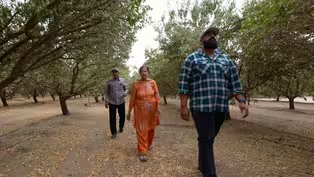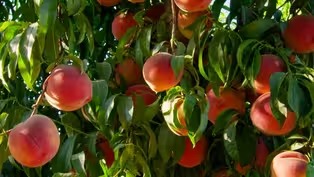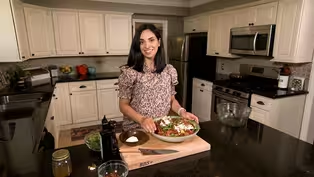
Alaskan Flour Factory
Clip: 6/30/2023 | 5m 24sVideo has Closed Captions
An Alaska family builds a flour factory right on their barley farm.
An Alaska family builds a flour factory right on their barley farm, and leads the way in promoting soil health to others.
Problems playing video? | Closed Captioning Feedback
Problems playing video? | Closed Captioning Feedback
America's Heartland is presented by your local public television station.
Funding for America’s Heartland is provided by US Soy, Sustainable Agriculture Research and Education, Rural Development Partners, and a Specialty Crop Grant from the California Department of Food and Agriculture.

Alaskan Flour Factory
Clip: 6/30/2023 | 5m 24sVideo has Closed Captions
An Alaska family builds a flour factory right on their barley farm, and leads the way in promoting soil health to others.
Problems playing video? | Closed Captioning Feedback
How to Watch America's Heartland
America's Heartland is available to stream on pbs.org and the free PBS App, available on iPhone, Apple TV, Android TV, Android smartphones, Amazon Fire TV, Amazon Fire Tablet, Roku, Samsung Smart TV, and Vizio.
Providing Support for PBS.org
Learn Moreabout PBS online sponsorship♪♪ [Laughing] It's breakfast time at the Wrigley farm, a scene playing out every morning on thousands of farms all across the heartland, a meal shared and cherished by Bryce Wrigley, wife Jan, son Milo, daughter-in-law Leah, and their kids Payton and Chett.
[Sound of griddle sizzling] What makes this breakfast unique?
Well, the hot cereal and pancakes are made from barley grown and harvested right here, on this 1700 acre farm about 100 miles outside Fairbanks.
What's more, the mixes are manufactured at the Alaska Flour Company, built by the Wrigleys in 2011, and also right here on the farm.
[Milo Wrigley] This is the only commercial flour mill in the state of Alaska.
We were farmers and this was a really big step for us to take on.
I realized that... that we have the potential to do something great.
The family says they built the flour mill for several reasons.
They wanted to grow this area's barley products beyond cattle feed, they wanted consumers to experience the health benefits of barley, and they wanted to provide a reliable Alaska-grown food source to consumers in the state and beyond.
[Bryce Wrigley] We really started getting focused, uh, hard on food security after we watched the aftermath of Hurricane Katrina.
We were just trying to market a crop that would become, uh, an alternative to hunger, in the event of an emergency.
And... and then, we find out that what we're building is actually really healthy for you.
[Jan Wrigley] When people understand our love for what we do, and the value of taking care of what we have will also benefit them... We are here to provide healthy food for them that we would do for our own families.
♪♪ That focus on helping others is also deeply rooted in the Wrigley's desire to help fellow farmers and the environment.
That means sustainable agriculture.
Since 2010, they've practiced "no-till," reducing soil disturbance and allowing residue from the previous harvest to remain on the soil.
Fallowed fields are planted with a mix of up to 15 cover crops during Alaska's short growing season.
Here are long rows of cover crop test plots, each planted with different species.
Cover crops feed the soil microbes that build organic matter and enhance soil health.
Healthier soils result in better barley harvests, and also help prevent carbon from entering the atmosphere.
[Bryce] To me, sustainability means just being able to have something that goes on perpetually and in perpetuity.
You're not, um, degrading the soil, so- and... and you're always looking for something to improve it.
If you want to try something but you're not sure you can afford it, try it on a small scale.
Bryce shares the benefits of sustainability at gatherings like this one, the third annual Soil Health Field Day, hosted by the Salcha-Delta Soil and Water Conservation District at the Wrigley's farm.
Here, soil experts like Jay Fuhrer offer hands-on demonstrations, showing farmers how no-till and cover crops reduce erosion, save water, protect the environment, and restore nutrients to the soil.
♪♪ This demonstration brings a smile.
Men's cotton briefs are buried for six weeks in different fields.
"Okay..." The "tighty whities" dug up in a no-till cover crop field are the most decomposed, a sure sign there's a lot of healthy microbes hard at work.
[Jay Fuhrer] We bring the... the full array, the full complement, a full suite of soil health practices.
I think we, at the end of the day, we'll... we'll have a much more sustainable future for everyone.
[Jim Eastwood] I think we're still learning and it's a curve that you learn, but, uh, we're coming along, I think.
[Bryce] Farmers learn best by actually coming out to a field day and seeing what are you doing and how are you doing it?
Because I've always been one that, not only did I want to do things that were good, but I also wanted to make sure that other people could... could learn from me.
It's all part of the values shared by the Wrigleys and many other farmers: a desire to leave the land in better shape than how they found it, and a hope that the next generation will be able to continue this noble profession.
[Bryce] We want this farm to be not only available for Milo's generation, for our son's generation, but for his kids.
And we hope that this continues.
[Jan] Every day, we come out here and look out at our fields and what we have, and we just, you know, we realize we're very blessed and fortunate.
♪♪ Agriculture may not be the first thing that comes to mind when you think of Alaska.
However, there are more than 800,000 acres of farmland in the state.
Root vegetables like potatoes, beets and carrots do especially well in Alaskan soil.
Berries also grow abundantly in vast wilderness areas.
Although the Alaska blueberry is often top of the list, there are nearly 50 varieties of edible berries that grow in the great land.
Video has Closed Captions
Clip: 6/30/2023 | 5m 15s | Meet an almond farmer whose parents immigrated from India. (5m 15s)
Video has Closed Captions
Clip: 6/30/2023 | 6m 15s | Fresh, ripe summer peaches are the top crop at this Fresno farm. (6m 15s)
Panzanella Salad – Farm to Fork with Sharon Profis
Video has Closed Captions
Clip: 6/30/2023 | 5m 11s | Make a Peach and Tomato Panzanella Salad at peak season. (5m 11s)
Providing Support for PBS.org
Learn Moreabout PBS online sponsorship

- Food
Christopher Kimball’s Milk Street Television
Transform home cooking with the editors of Christopher Kimball’s Milk Street Magazine.












Support for PBS provided by:
America's Heartland is presented by your local public television station.
Funding for America’s Heartland is provided by US Soy, Sustainable Agriculture Research and Education, Rural Development Partners, and a Specialty Crop Grant from the California Department of Food and Agriculture.



